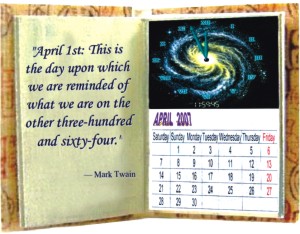Feature
What is April Fool's Day?
Compiled by Muhammad Shafaq Hussain
 April Fools' Day, sometimes also called All Fools' Day, is one of the most lighthearted days of the year. Its origins are uncertain. Some see it as a celebration related to the turn of the seasons, while others believe it stems from the adoption of a new calendar. April Fools' Day, sometimes also called All Fools' Day, is one of the most lighthearted days of the year. Its origins are uncertain. Some see it as a celebration related to the turn of the seasons, while others believe it stems from the adoption of a new calendar.
New Year's Day Moves
Ancient cultures, including those as varied as that of the Romans and the Hindus celebrated New Year's Day on or around April 1. It closely follows the vernal equinox. In medieval times, much of Europe celebrated March 25, the Feast of Annunciation, as the beginning of the New Year.
The Origin
The origin of this custom has been much disputed. Many theories have been suggested. What seems certain is that it is in some way or other a relic of the once universal festivities held at the vernal equinox, which, beginning on old New Year's Day, the 25th of March, ended on the 2nd of April.
It has been suggested that Europe inherited this tradition from the French. France was one of the first nations to make January 1 its official New Year's Day, by decree of Charles IX. This was in 1564, even before the adoption of the Gregorian calendar. Thus the New Year's gifts and visits of felicitation which had been the feature of the 1st of April became associated with the first day of January, and those who disliked the change or had not been informed about it were fair game for those who amused themselves by sending mock presents and paying calls of pretended ceremony on the 1st of April. French and Dutch references from 1508 and 1539 respectively describe April Fools' Day jokes on the first of April.
Though the 1st of April appears to have been anciently observed in Great Britain as a general festival, it was apparently not until the beginning of the 18th century that the making of “April-fools” became a common custom.
In Scotland the custom was known as "hunting the gawk," i.e. the cuckoo, and April-fools were "April-gawks," the cuckoo being, as it is in many countries, a term of contempt.
In France, the person fooled is known as poisson d'avril. This has been explained from the ideas arising that in April the sun quits the zodiacal sign of the fish. A far more natural explanation would seem to be that the April fish would be a young fish and therefore easily caught. The French traditionally celebrated this holiday by placing a dead fish on the back of friends. Today, a paper cutout substitutes for the fish.
The Dutch celebrate the 1st of April for other reasons. In 1572, Spain's King Philip II ruled the Netherlands. Roaming the region were Dutch rebels who called themselves Geuzen, after the French "gueux" meaning beggars. On 1st April 1572, the Geuzen seized the small coastal town of Den Briel. This was also the start of the general civil rising against the Spanish in other cities of Netherlands. The Duke of Alba, commander of the Spanish army, could not prevent the uprising. Briel is the Dutch word for glasses, so on 1 April 1572, "Alba lost his glasses". Dutch people find this joke so hilarious that they still commemorate the first of April.
Source: www.wikipedia.org
| 